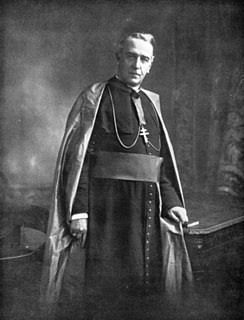Related Research Articles
Samaritans is a registered charity aimed at providing emotional support to anyone in emotional distress, struggling to cope, or at risk of suicide throughout Great Britain and Ireland, often through their telephone helpline. Its name derives from the biblical Parable of the Good Samaritan although the organisation itself is non-religious.

Edward Chad Varah was a British Anglican priest and social activist from England. In 1953, he founded the Samaritans, the world's first crisis hotline, to provide telephone support to those contemplating suicide.

John Charles McQuaid, C.S.Sp., was the Catholic Primate of Ireland and Archbishop of Dublin between December 1940 and January 1972. He was known for the unusual amount of influence he had over successive governments.
Canon James Goodman was a Church of Ireland clergyman, a piper and a collector of Irish music and songs.
John Robert Winder Neill was the Church of Ireland Archbishop of Dublin until the end of January 2011.

Edward Joseph Byrne was an Irish prelate of the Catholic Church. He served as Archbishop of Dublin from 1921 until his death in 1940.
George Otto Simms was an archbishop in the Church of Ireland.
Thomas Arnold Harvey was an Irish cricketer and Rugby Union player. He was captain of Dublin University Cricket Club in 1902, and while still at Trinity College, Dublin (TCD) toured with an Ireland XI. Harvey was also an international hurdler as a student. He later became a Church of Ireland (Anglican) bishop.

The Parish of Taney is a populous parish in the Church of Ireland, located in the Dundrum area of Dublin.
The Parish of Raheny is the modern successor in the Church of Ireland to an early (1152) parish, in Raheny, a district of Dublin reputed to be a site of Christian settlement back to 570. Today's parish comprises Raheny village and the wider district, and is in a Union with the Parish of Coolock. Its parish church is All Saints' Church, Raheny.
Frederick Falkiner Standish Smithwick (1879–1962) was an Irish rugby international. He won two caps in 1898.

Trevor Williams is the former Bishop of Limerick and Killaloe in the Church of Ireland.
Albert Edward Hughes was Bishop of Kilmore, Elphin and Ardagh from 1939 to 1950.

Joseph Ferguson Peacocke was a Church of Ireland cleric. He was the Bishop of Meath from 1894 to 1897 and then Archbishop of Dublin from 1897 until 1915. He was also briefly the professor of pastoral theology at Trinity College, Dublin.
Robert Cyril Hamilton Glover Elliott was an eminent Irish clergyman in the middle of the 20th century. Ordained in 1915, he began his career as a chaplain to the Forces, after which he was Rector of All Saints, Belfast, Vicar of Ballymacarrett then Rector of Downpatrick. Promotion to be Dean of St Anne's Cathedral, Belfast, followed, after which he was elevated to the episcopate as Bishop of Connor. In retirement he continued to serve the Church as a Sub-Prelate of the Order of St John of Jerusalem.
Arthur Hamilton Butler was an Irish bishop in the Church of Ireland in the second half of the 20th century.
John West was an Irish Anglican priest. He was Dean of St Patrick’s Cathedral, Dublin in the Church of Ireland from 1864 to 1889.
Charles Thomas Ovenden was an Irish Anglican priest, author, and Dean of St. Patrick's Cathedral, Dublin of the Church of Ireland.
Henry Francis Neville was an Irish Roman Catholic priest and educator who served as Rector of the Catholic University of Ireland and Dean of Cork.
George Robert Wynne (1838–1912), known as Robert, was a Church of Ireland minister and prolific author of works on religious topics.
References
- 1 2 3 4 5 "Samaritans founder helped to save and enhance many lives". Irish Times: 18. 22 January 2000.
- 1 2 "Installation of Canon Billy Wynne". Irish Times: 5. 11 January 1977.
- 1 2 3 "The Saturday Interview: Brendan Lynch talked to Canon Billy Wynne founder of the Irish Samaritans organisation". Irish Times. 12 December 1983.
- 1 2 "Honorary doctorates for two well-known Dublin figures". Church of Ireland Gazette: 3. 12 January 1996.
- 1 2 3 4 5 "If you are in trouble the Canon promises that someone will listen". Evening Press: 8. 9 May 1984.
- 1 2 McGarry, Patsy (21 January 2000). "Last tribute to Irish Samaritans founder". Irish Times: 9.
- ↑ Wynne, Billy; MacNamara, Francis (2000). Called to think anew. Dublin: Irish Times. ISBN 9780907011309.
- 1 2 3 "Tributes paid to founder of Samaritans in Ireland". Church of Ireland Gazette: 1. 28 January 2000.
- 1 2 Burkes Irish Family Records. London: Burkes Peerage. 1976. pp. 1228–1229.
- ↑ Leyel, Peter A. (23 March 2012). "A distinguished Barbadian: The story of my Grandfather, Sir George Campbell Deane" (PDF). academia.edu. Retrieved 13 August 2021.
{{cite web}}: CS1 maint: url-status (link) - ↑ "Obituary: the Rev. G.R.L. Wynne". Irish Times: 3. 18 April 1945.